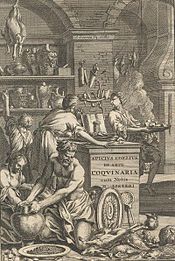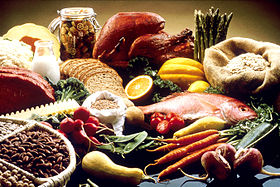- Cuisine
-
Contents
Part of a series on Meals 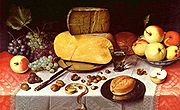
Common meals Breakfast · Brunch · Lunch · Tea · Dinner · Supper Components & courses Amuse-bouche · Appetizer · Cheese · Cocktails · Dessert · Drink · Entrée · Entremet · Fruit · Main course · Nuts · Salad · Side dish Related concepts Banquet · Buffet · Cuisine · Eating · Etiquette · Food · Global cuisines · Outline of cuisines · Snack Cuisine (from French cuisine, "cooking; culinary art; kitchen"; ultimately from Latin coquere, "to cook") is a characteristic style of cooking practices and traditions,[1] often associated with a specific culture. Cuisines are often named after the geographic areas or regions that they originate from.[2] A cuisine is primarily influenced by the ingredients that are available locally or through trade. Religious food laws, such as Islamic dietary laws and Jewish dietary laws, can also exercise a strong influence on cuisine. Regional food preparation traditions, customs and ingredients often combine to create dishes unique to a particular region.[3]
History
There have been many significant improvements during the last century in food preservation, storage, shipping and production.[5] Today, most countries, cities and regions have access to their traditional cuisines and many other global cuisines,[5] and new cuisines continue to evolve in contemporary times. An example is fusion cuisine, which combines elements of various culinary traditions while not being categorized per any one cuisine style, and generally refers to the innovations in many contemporary restaurant cuisines since the 1970s.[6]
Cuisine can be stated as the foods and methods of food preparation traditional to a region or population.[2] The major factors shaping a cuisine are climate, which in large measure determines the native raw materials that are available, economic conditions, which affect trade and can affect food distribution, imports and exports, and religious or sumptuary laws, under which certain foods are required or proscribed.
Climate also affects the supply of fuel for cooking; a common Chinese food preparation method was cutting food into small pieces to cook foods quickly and conserve scarce firewood and charcoal. Foods preserved for winter consumption by smoking, curing, and pickling have remained significant in world cuisines for their altered gustatory properties even when these preserving techniques are no longer strictly necessary to the maintenance of an adequate food supply.
Global and regional cuisines
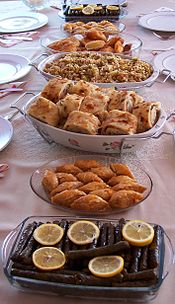 Turkish cuisine
Turkish cuisine
Global cuisines can be categorized by various regions according to the common use of major foodstuffs, including grains, produce and cooking fats. Regional cuisines may vary based upon food availability and trade, cooking traditions and practices, and cultural differences.[2] For example, in Central and South America, corn (maize), both fresh and dried, is a staple food. In northern Europe, wheat, rye, and fats of animal origin predominate, while in southern Europe olive oil is ubiquitous and rice is more prevalent. In Italy the cuisine of the north, featuring butter and rice, stands in contrast to that of the south, with its wheat pasta and olive oil. China likewise can be divided into rice regions and noodle & bread regions. Throughout the Middle East and Mediterranean there is a common thread marking the use of lamb, olive oil, lemons, peppers, and rice. The vegetarianism practiced in much of India has made pulses (crops harvested solely for the dry seed) such as chickpeas and lentils as significant as wheat or rice. From India to Indonesia the use of spices is characteristic; coconuts and seafood are used throughout the region both as foodstuffs and as seasonings.
See also
"The more you eat, the less flavor; the less you eat, the more flavor."
Chinese Proverb- Bouchon
- Comfort food
- Culinary arts
- Culinary school
- Food festival
- Foodie
- Gourmet
- Gourmet Museum and Library
- Indian cuisine
- International English food terms
- List of street foods around the world
- National dish
- Outline of cuisines
- Outline of food preparation
- Restaurant
- Steakhouse
- Street food
References
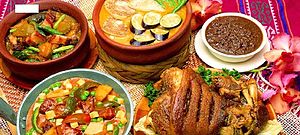 Filipino cuisine
Filipino cuisine
- ^ "Cuisine." Thefreedictionary.com. Accessed June 2011.
- ^ a b c "The American Food Revolutions: Cuisines in America." Eldrbarry.net. Accessed June 2011.
- ^ "Rediscover the flavors and traditions of true American cuisine!" Whatscookingamerica.net. Accessed June 2011.
- ^ Rajvanshi, Anil K. (2004). "Nature Conservation + Spirituality = Sustainability." Nimbkar Agricultural Research Institute . Google Documents. Accessed July 2011.
- ^ a b "Humans." Solarnavigator.net. Accessed June 2011.
- ^ Lindsey, Robert (1985-08-18)). ""California Grows Her Own Cuisine."". New York Times. http://query.nytimes.com/gst/fullpage.html?res=9E02E0DD1F38F93BA2575BC0A963948260&sec=travel&pagewanted=print.
Further reading
- Albala, Ken (2011.) Food Cultures of the World Encyclopedia Greenwood. ISBN 9780313376269
External links
- eNotes - Encyclopedia of Food and Culture
- The Global Gastronomer - Cuisines of the World
- Wikia - Recipes Wiki
- Wikibooks Cookbook
Related information
African cuisine National cuisines - Algeria
- Angola
- Benin
- Botswana
- Burkina Faso
- Burundi
- Cameroon
- Cape Verde
- Centrafrican (Central African Republic)
- Chad
- Comoros
- The Republic of the Congo
- The Democratic Republic of the Congo
- Egypt
- Eritrea
- Ethiopia
- Gabon
- Ghana
- Ivorian (Côte d'Ivoire)
- Kenya
- Libya
- Madagascar
- Morocco
- Mozambique
- Namibia
- Nigerien (Niger)
- Nigerian
- Rwanda
- Senegal
- Sierra Leone
- Somalia
- South Africa
- Sudan
- Swaziland
- Tanzania
- Tunisia
- Uganda
- Zambia
- Zimbabwe
Ethnic and regional cuisines American cuisine Historical Regional Allentown, Pennsylvania · California · Cincinnati · Kentucky · Hawaii · Midwestern · Chicago · New England · New Mexico · New York City · Omaha · Pacific Northwest · Philadelphia · Puerto Rico · Southern · Cajun · Creole · Lowcountry · Barbecue in Texas · Tex-Mex · Floribbean · Southwest · Western
Ethnic American Chinese · Soul food · Native American · Pennsylvania Dutch · Italian American · Tlingit
Miscellanea Asian cuisine Sovereign
states- Afghanistan
- Armenia
- Azerbaijan
- Bahrain
- Bangladesh
- Bhutan
- Brunei
- Burma (Myanmar)
- Cambodia
- People's Republic of China
- Cyprus
- East Timor (Timor-Leste)
- Egypt
- Georgia
- India
- Indonesia
- Iran
- Iraq
- Israel
- Japan
- Jordan
- Kazakhstan
- North Korea
- South Korea
- Kuwait
- Kyrgyzstan
- Laos
- Lebanon
- Malaysia
- Maldives
- Mongolia
- Nepal
- Oman
- Pakistan
- Philippines
- Qatar
- Russia
- Saudi Arabia
- Singapore
- Sri Lanka
- Syria
- Tajikistan
- Thailand
- Turkey
- Turkmenistan
- United Arab Emirates
- Uzbekistan
- Vietnam
- Yemen
States with limited
recognition- Abkhazia
- Nagorno-Karabakh
- Northern Cyprus
- Palestine
- Republic of China (Taiwan)
- South Ossetia
Dependencies and
other territoriesEuropean cuisine Sovereign
states- Albania
- Andorra
- Armenia
- Austria
- Azerbaijan
- Belarus
- Belgium
- Bosnia and Herzegovina
- Bulgaria
- Croatia
- Cyprus
- Czech Republic
- Denmark
- Estonia
- Finland
- France
- Georgia
- Germany
- Greece
- Hungary
- Iceland
- Ireland
- Italy
- Kazakhstan
- Latvia
- Liechtenstein
- Lithuania
- Luxembourg
- Macedonia
- Malta
- Moldova
- Monaco
- Montenegro
- Netherlands
- Norway
- Poland
- Portugal
- Romania
- Russia
- San Marino
- Serbia
- Slovakia
- Slovenia
- Spain
- Sweden
- Switzerland
- Turkey
- Ukraine
- United Kingdom
- (England
- Northern Ireland
- Scotland
- Wales)
- Vatican City
States with limited
recognition- Abkhazia
- Kosovo
- Nagorno-Karabakh Republic
- Northern Cyprus
- South Ossetia
- Transnistria
Dependencies
and other territories- Åland
- Faroe Islands
- Gibraltar
- Guernsey
- Jan Mayen
- Jersey
- Isle of Man
- Svalbard
Cuisine of the Mediterranean Northern Africa Southern Europe European regions Western Asia Middle Eastern cuisine North American cuisine Sovereign states - Antigua and Barbuda
- Bahamas
- Barbados
- Belize
- Canada
- Costa Rica
- Cuba
- Dominica
- Dominican Republic
- El Salvador
- Grenada
- Guatemala
- Haiti
- Honduras
- Jamaica
- Mexico
- Nicaragua
- Panama
- Saint Kitts and Nevis
- Saint Lucia
- Saint Vincent and the Grenadines
- Trinidad and Tobago
- United States

Dependencies and
other territories- Anguilla
- Aruba
- Bermuda
- Bonaire
- British Virgin Islands
- Cayman Islands
- Curaçao
- Greenland
- Guadeloupe
- Martinique
- Montserrat
- Puerto Rico
- Saint Barthélemy
- Saint Martin
- Saint Pierre and Miquelon
- Saba
- Sint Eustatius
- Sint Maarten
- Turks and Caicos Islands
- United States Virgin Islands
South American cuisine Sovereign states Dependencies and
other territories- Aruba
- Bonaire
- Curaçao
- Falkland Islands
- French Guiana
- Latin American cuisine
North America - Mexico

Central America - Belize · Costa Rica
- El Salvador
- Guatemala
- Honduras
- Nicaragua
- Panama
Caribbean - Antigua and Barbuda
- Bahamas
- Barbados
- Cuba
- Dominica
- Dominican Republic
- Grenada
- Haiti
- Jamaica
- Puerto Rico1
- St. Kitts and Nevis
- St. Lucia
- St. Vincent and the Grenadines
- Trinidad and Tobago
South America - Dependencies not included.
- 1 Defined as a semi-autonomous territory.
Wine by country Albania · Algeria · Argentina · Armenia · Australia · Austria · Azerbaijan · Belgium · Brazil · Bulgaria · Canada · Chile · China · Croatia · Cyprus · Czech Republic · Denmark · Egypt · France · Germany · Georgia · Greece · Hungary · India · Iran · Israel · Italy · Japan · Kazakhstan · Lebanon · Liechtenstein · Luxembourg · Macedonia · Malta · Mexico · Moldova · Montenegro · Morocco · Namibia · Netherlands · New Zealand · Portugal · Romania · Russia · San Marino · Serbia · Slovakia · Slovenia · South Africa · Spain · Sweden · Switzerland · Turkey · Ukraine · United Kingdom · United States · Uruguay · Vietnam Categories:
Categories:- Cuisine
- French loanwords
Wikimedia Foundation. 2010.

